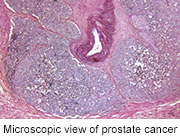Physical side effects seen over first 12 months of ADT persist or worsen over 36 months of follow-up
TUESDAY, March 31, 2015 (HealthDay News) — For patients with prostate cancer, androgen deprivation therapy (ADT) has a lasting impact on physical function, according to a study published online March 24 in Cancer.
Shabbir M.H. Alibhai, M.D., from the University Health Network in Toronto, and colleagues examined the impact of ADT on physical function and quality of life over 36 months. They enrolled 87 men with nonmetastatic prostate cancer who were starting continuous ADT, and two control groups matched by age and education (86 prostate cancer patients without ADT and 86 healthy controls).
The researchers found that in both control groups there was an initial improvement in the six-minute walk test which then stabilized, while there was no change for ADT users (P = 0.0030). In control groups, grip strength remained stable, but there was a sharp decline in the ADT group by three months, which then remained stable to 36 months (P = 0.0041). Over 36 months, Timed Up and Go scores declined gradually in the ADT group and did not change in control groups (P = 0.0001). In all groups, the aggregate mental quality of life was stable. Declines seen in the first year of ADT use were independent of age and generally persisted during 36 months.
“Previously noted physical side effects over the first 12 months of ADT persisted or continued to worsen over an additional two years with no evidence of recovery,” the authors write. “Exercise interventions to counteract these declines may be warranted.”
One author disclosed financial ties to the biopharmaceutical industry.
Copyright © 2015 HealthDay. All rights reserved.








